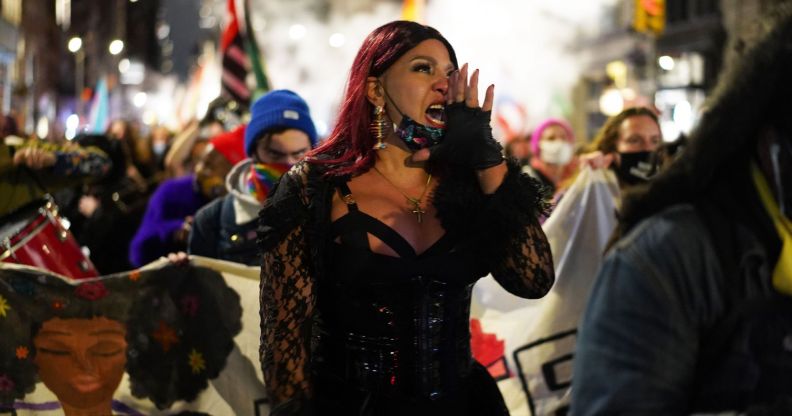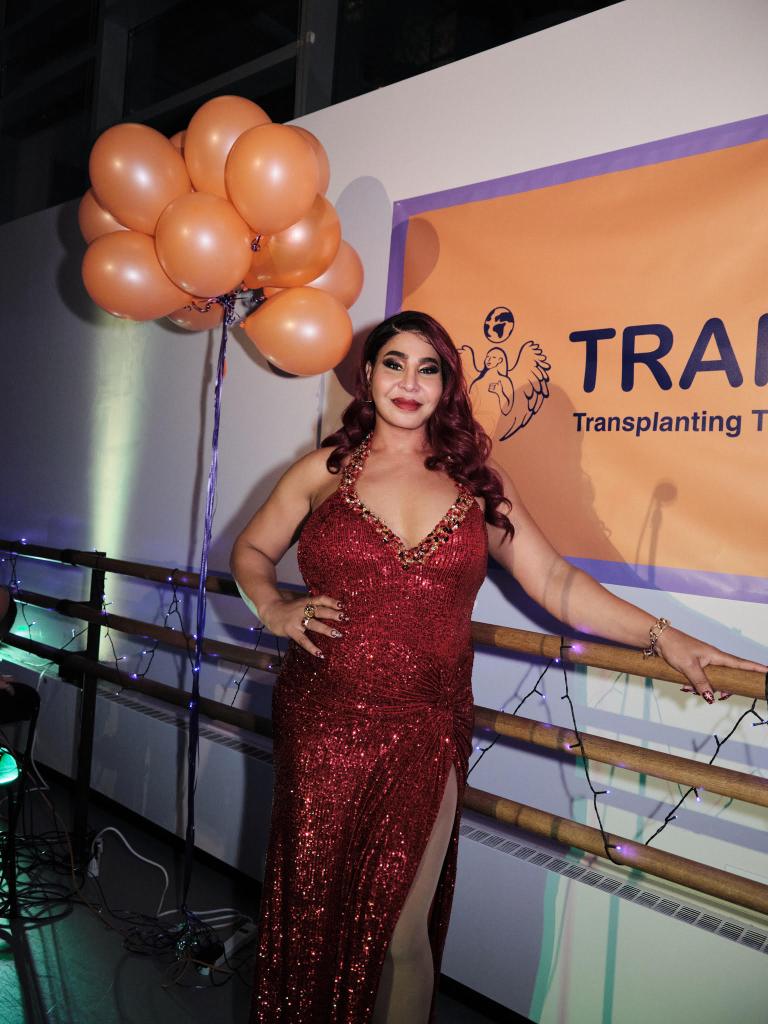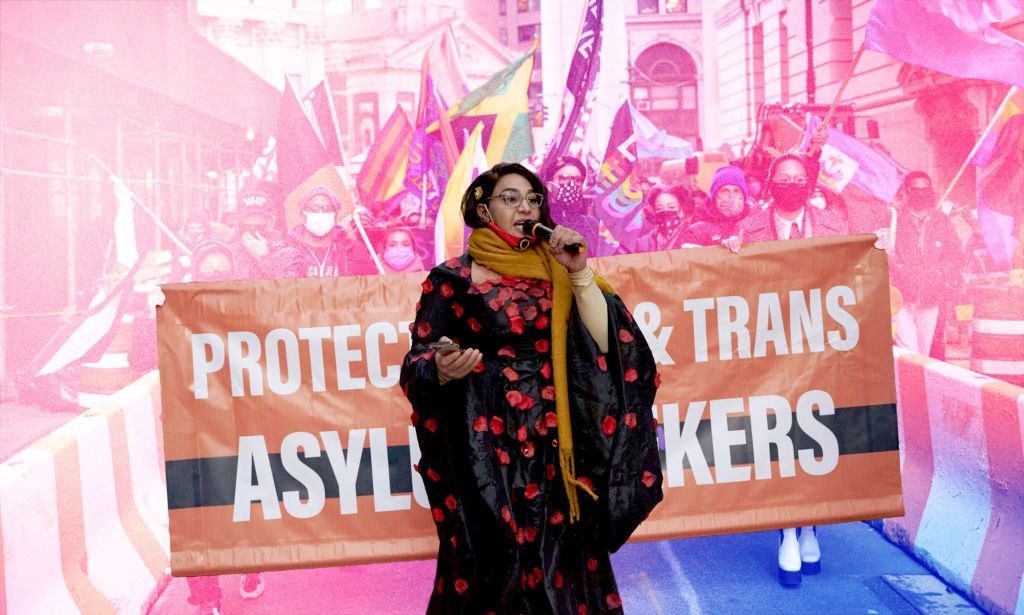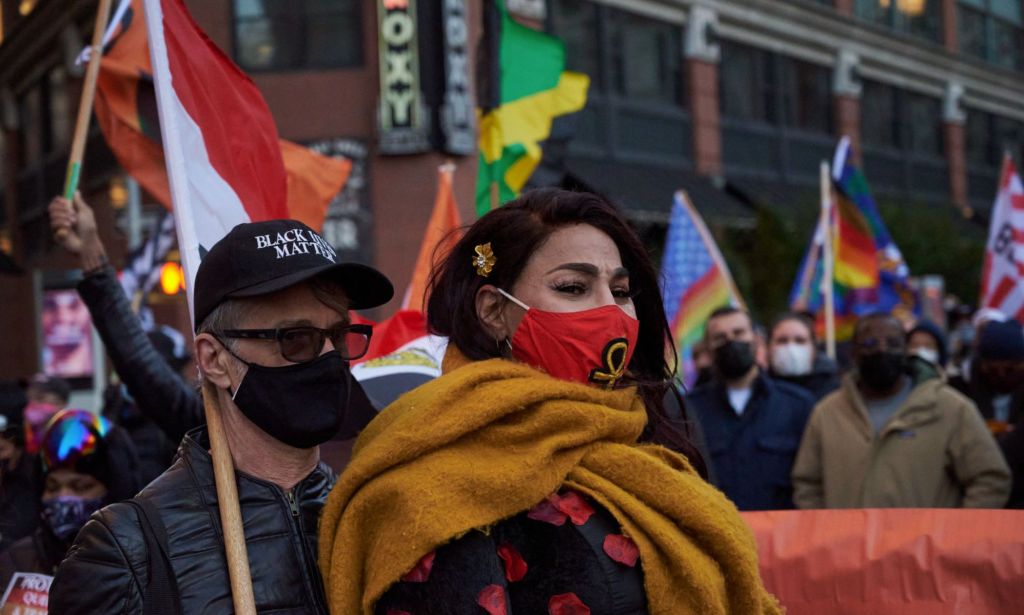Iman Le Caire: Trans woman who fled home after being stabbed by own brother is saving trans lives

Iman Le Caire began to ‘heal her soul’ when she was able to flee Egypt and find safety in the USA. (DJ Lehrhaupt)
Iman Le Caire helps trans people facing abuse and even death in their home countries find safety abroad. It’s something she knows all too well. Content warning: rape and violence.
Le Caire grew up in Egypt, with a family whose journey towards conservatism put her in danger as she began to figure out her gender identity.
As well as receiving abuse from family members, at age eight she was raped by someone who threatened to tell her family and kill her.
“When that happened, they sort of blamed me,” Le Caire tells PinkNews. She was told that she was “an evil child”, and it was suggested that because of her femininity, she must have “seduced” her rapist.
“In Egypt there’s the masculine and there is the feminine,” she explains.
“The feminine always is the bad one. [I] was a child. I didn’t seduce anyone. I was just being myself, and they did not understand gender or anything.”
“My mom started beating me up for it, and the whole street found out so I was subjected to harassment and more rape because of this.
“And there was no help or anything.”

Le Caire remembers being told that she needed to “go to the mosque” and “clean [her] soul from all that sin” to “redeem” herself.
Her older brother would hit and beat her if he perceived her as acting even somewhat feminine. Le Caire remembers one occasion when he went as far as stabbing her.
As she bled, he misgendered her, refusing to take her to hospital despite their sister’s pleas.
“I remember he’s like: ‘Let [her] die. We don’t want [her] around, and [she’s] bringing us shame,’” Le Caire says.
Despite living in ‘survival mode’, Le Caire says she was a “happy person” fighting for a future where she could live as her authentic self.
She dove headfirst into dance to “hold onto something”, and it was this that would eventually help her to escape Egypt.
Through dance, Le Caire was able to get a temporary visa to travel to New York City in 2008, where she applied for asylum.
Alone in the city and scared for her life, she struggled to communicate with people. Her English wasn’t great at first, and she found herself homeless for a while. Then, she fought drug addiction while trying to survive.

Eventually, Le Caire found solace and safety in her relationship with her now husband. It was during this time that she was able to ‘heal her soul’ and explore her trans identity.
“I wanted to heal my inner child,” she says. “I wanted to heal this girl that has always been there with me, and also my ancestors … they treated them like kings and queens to be gay or to be transgender, in ancient Egypt.”
Le Caire had a political awakening after the death of George Floyd, a Black man murdered by a white police officer, in May 2020.
She says the issues that fuelled that summer’s Black Lives Matter protests brought to mind the discrimination and abuse trans people face abroad, and it inspired her to fight for her sisters worldwide.
Iman Le Caire founded Trans Asylias in 2021 to help trans people persecuted in their home countries find asylum. She has since helped 10 people from places like Saudi Arabia, Jamaica, Syria, Yemen and Egypt find safety.
Through her organisation, Le Caire helps check through trans people’s asylum applications, gives them advice and raises money to fund their relocation to countries like France, the Netherlands and Canada.
It’s an immensely fulfilling experience for Le Caire.
“They are like my daughters,” she says of the women she’s helped. “I feel like I became a mommy. In all my dreams, I feel like I wanted to become a mommy, and [they] say trans women can’t get pregnant. No, I can get children. I have children.”
Iman Le Caire’s work is crucial at a time when some countries, like the UK, are hostile towards asylum seekers.
The UK government’s Illegal Migration Bill has made many fear for the future. The bill would see adults who arrive in the UK via the English Channel or in the back of a lorry detained for 28 days.
They would then be sent back to their country of origin or a third country like Rwanda. It’s a move many LGBTQ+ rights and human rights campaigners have called dangerous for queer people fleeing for their lives from countries that criminalise their existence.
Despite legal challenges, home secretary Suella Braverman continues to push forward with these reviled plans. She’s said it’s her “dream” and “obsession” to see a flight departing the UK carrying people seeking asylum to Rwanda.
Le Caire says it’s “very hard” to hear such hostility towards asylum seekers.
She says it’s particularly “frustrating” because it shows how political leaders are failing to understand the very meaning of the word “asylum”.

An asylum seeker, she underlines, is somebody seeking protection from persecution and serious human rights violations in a country, and this includes LGBTQ+ people fleeing discrimination.
“For LGBTQ+ people, there is no option – it’s life or death if we go back,” she says. “Instead of saying ‘I don’t want gay people’ just say ‘I’m hateful’.”
She also notes the legacy of British colonization seen in anti-LGBTQ+ laws across Africa.
Le Caire continues: “England has a record of changing Africa and changing Egypt.
“[We should] really fight with people to bring asylum to the LGBTQ, especially transgender people [who] are visible, more visible. They cannot hide.
“We need to bring asylum back to the actual meaning of asylum.”
Same-sex sexual activity is prohibited in Egypt under a law which criminalises acts of ‘indecency’ and ‘debauchery’. The legislation has mainly been weaponised against queer men, but anyone found guilty under this legislation faces a maximum penalty of three years imprisonment and a fine.
LGBTQ+ people are frequently subject to arrest and abuse at the hands of violent gangs and corrupt law enforcement in Egypt. There have been multiple reports of police using several methods to arrest queer people, including using dating apps and social media to entrap them.
Reports also note that discrimination and violence – including harassment, physical violence and intimidation – have been committed against LGBTQ+ people in Egypt.
Rape Crisis England and Wales works towards the elimination of sexual violence. If you’ve been affected by the issues raised in this story, you can access more information on their website or by calling the National Rape Crisis Helpline on 0808 802 9999. Rape Crisis Scotland’s helpline number is 08088 01 03 02.
Readers in the US are encouraged to contact RAINN, or the National Sexual Assault Hotline on 800-656-4673.

